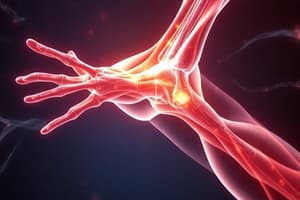Podcast
Questions and Answers
What is the term for the muscle attached to an immovable bone?
What is the term for the muscle attached to an immovable bone?
origin
What is the name for the moveable end of a muscle?
What is the name for the moveable end of a muscle?
insertion
What type of movement involves slipping movements only with no axis?
What type of movement involves slipping movements only with no axis?
nonaxial movement
What type of synovial joint motion allows movement in one plane? (e.g., elbow)
What type of synovial joint motion allows movement in one plane? (e.g., elbow)
What type of synovial joint motion allows movement in two planes? (e.g., knuckle)
What type of synovial joint motion allows movement in two planes? (e.g., knuckle)
What type of synovial joint motion allows movement in three planes? (e.g., shoulder)
What type of synovial joint motion allows movement in three planes? (e.g., shoulder)
What are three types of movement?
What are three types of movement?
What is the definition of gliding?
What is the definition of gliding?
What includes flexion and extension, abduction & adduction?
What includes flexion and extension, abduction & adduction?
What is the term for circular movement around an axis?
What is the term for circular movement around an axis?
What is flexion?
What is flexion?
What is extension?
What is extension?
What is hyperextension?
What is hyperextension?
What is dorsiflexion?
What is dorsiflexion?
What is plantar flexion?
What is plantar flexion?
What does abduction refer to?
What does abduction refer to?
What is lateral flexion?
What is lateral flexion?
What is adduction?
What is adduction?
What is circumduction?
What is circumduction?
What is the term for rotation of the hands and forearms so that the palms face upward?
What is the term for rotation of the hands and forearms so that the palms face upward?
What is pronation?
What is pronation?
What does inversion refer to?
What does inversion refer to?
What is eversion?
What is eversion?
What is protraction?
What is protraction?
What is retraction?
What is retraction?
What is elevation?
What is elevation?
What is depression?
What is depression?
What is opposition?
What is opposition?
Flashcards are hidden until you start studying
Study Notes
Key Terms and Definitions
- Origin: Muscle attachment point on an immovable bone.
- Insertion: Moveable end of a muscle allowing for action.
Synovial Joint Movement Types
- Nonaxial Movement: Involves slipping movements without rotation around an axis.
- Uniaxial Movement: Joint motion occurring in one plane, e.g., elbow flexion and extension.
- Biaxial Movement: Joint motion permitted in two planes, e.g., knuckle movements.
- Multiaxial Movement: Joint motion possible in three planes, e.g., shoulder movements.
Types of Movements
- Gliding: Bones slide over one another at partially movable joints.
- Angular Movements:
- Flexion: Decrease in the angle between bones, bringing them closer.
- Extension: Increase in the angle at a joint, straightening the limb.
- Hyperextension: Excessive backward movement causing possible injury.
- Abduction: Movement of a limb away from the midline of the body.
- Adduction: Movement of a limb towards the midline.
- Lateral Flexion: Sideways movement of the trunk at the waist.
- Circumduction: Movement where a limb traces a cone in space.
Rotational Movements
- Rotation: Circular movement around an axis, common at hip and shoulder joints.
- Supination: Rotation of the forearm so palms face upward.
- Pronation: Rotation of the forearm so palms face downward.
Ankle and Foot Movements
- Dorsiflexion: Flexing the foot at the ankle towards the shin.
- Plantar Flexion: Pointing the toes or foot downward.
- Inversion: Turning the sole of the foot inward.
- Eversion: Turning the sole of the foot outward.
Jaw and Shoulder Movements
- Protraction: Moving the mandible forward.
- Retraction: Moving the jaw back to its original position.
- Elevation: Upward movement, such as shrugging shoulders.
- Depression: Lowering a body part.
- Opposition: Thumb movement to touch fingertips, characteristic of saddle joints.
Studying That Suits You
Use AI to generate personalized quizzes and flashcards to suit your learning preferences.




